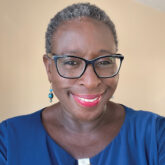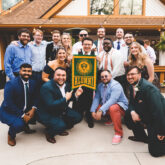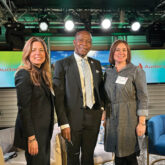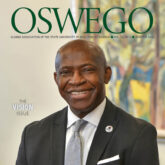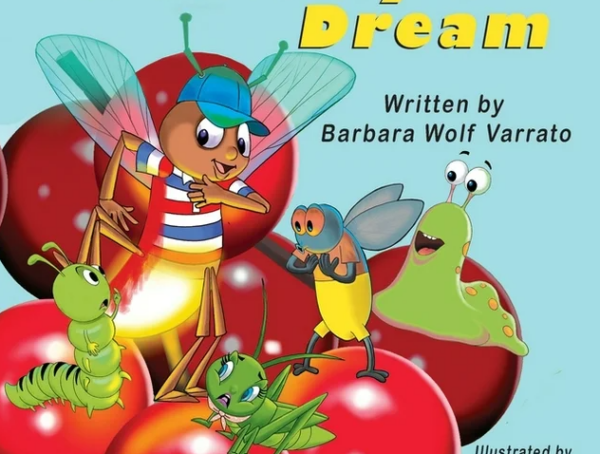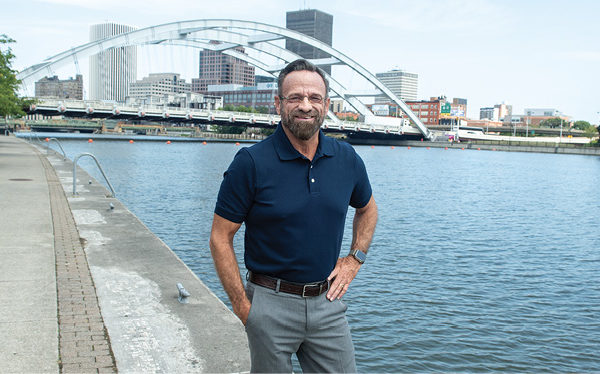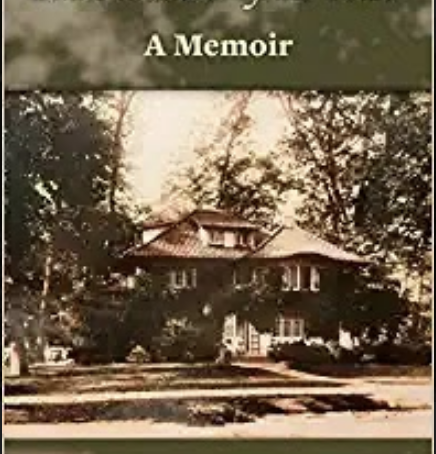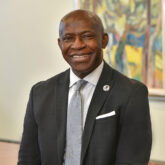
Alice McDermott ’75 is the author of seven novels, including Someone; After This; Child of My Heart; Charming Billy, winner of the 1998 National Book Award; and At Weddings and Wakes, all published by FSG. That Night, At Weddings and Wakes, and After This were all finalists for the Pulitzer Prize. In June, she was inducted into the New York State Writers Hall of Fame 2013. McDermott lives with her family outside Washington, D.C.
(This excerpt from Someone, a work of fiction, is set in the aftermath of World War II. In this chapter, author Alice McDermott ’75 writes about a returned airman telling his near-death story and explaining his miraculous reprieve. McDermott’s lyrical novel examines an ordinary woman’s life as it is lived day by day in an Irish-American Brooklyn neighborhood.)
His parachute training, Tom said, had been short and perfunctory, and after a few easy missions, he’d stopped even imagining himself jumping out of a plane. When the order came, the plane shuddering—like a subway car going over cobblestones, he said—he gripped the door. He seriously considered just hanging on. Going down with the ship. But then he felt a push from behind and then he dropped into the worst nightmare anybody ever had: cloud, smoke, the thick smell of the fuel. A dream’s endless falling.
He laughed telling it, as if it were a joke and the joke was on him.
He said he only remembered after he had pulled the parachute cord—touching his forehead in a comic gesture of despair—that he was supposed to count to ten before he pulled it, not after. And then he counted anyway, a second too late.
And then out of the noise of the worst and loudest sound he had ever heard and hoped never to hear again he fell into dead silence. Nothing at all, he said—and held out his hands and made his eyes wide to replicate his astonishment.
So suddenly quiet that he thought his ears were blown out for good. He saw the air was now blue and there was a serene patchwork world beneath him. Even children running across a churchyard, into a field, and he thought—“I kid you not” he said in his the-joke’s-on-me way—“now, this isn’t so bad. I could get used to this.”
The children were the first to reach him when he fell, tumbling back to the hard earth, busting up his shoulder, breaking his wrist.
“But those kids,” he said, “That was the luck of the Irish, it turned out.”
Because, he said, the next thing he knew a mad old Kraut was pointing a Luger at his head, so close that he could smell the hot metal. “He was in a tizzy,” Tom said. “Mad as hell,” and he apologized to my mother for his language. “I couldn’t understand anything he said but ‘kinder,’ waving the goddamn gun”—he apologized again—“and telling me, I guess, that he’d like to blow my brains out except for the kids who were there, all around us.
He even tried to chase them away, but they were having too much fun, throwing little handfuls of mud in my direction, yelling their heads off. So much excitement. You know how kids are.” He laughed and touched his fingers to the teacup. “The crazy old Kraut had enough decency not to want to shoot me in front of them.”
My mother put her hands to her lips and said, “Glory be.”
Tom gave a self-deprecating wave of his hand. “Well,” he said. “To make a long story short, a German officer showed up—officer hell, he looked all of eighteen—and gave the old man Hail Columbia in German, and then told me in English to get out of the harness and follow him—mach schnell—if I wanted to live. It took me a few minutes to get it. I thought I was already dead.”
He laughed again. He was enjoying our attention. He was a man who loved to talk.
“This fellow grabbed me under the arm. I was still wobbly-kneed, shaking like a leaf. He told me the old man was crazy, crazy with grief. He’d learned just the day before that his son, his only child, a German airman, had been killed by the Allies. So he was out for revenge. He would have put a bullet in my head if those kids hadn’t been there.”
“An eye for an eye,” my brother said.
 Tom sat forward. He shook his head. “But here’s the thing.” He was smiling oddly, with less mirth than before. “Here’s the way I looked at it. If the old guy had shot me, then and there, it wouldn’t have been the same. It wouldn’t have been equal.”
Tom sat forward. He shook his head. “But here’s the thing.” He was smiling oddly, with less mirth than before. “Here’s the way I looked at it. If the old guy had shot me, then and there, it wouldn’t have been the same. It wouldn’t have been equal.”
He turned to my mother, as if she alone needed an explanation. “I was an orphan, you see,” he told her. “A Foundling Home kid. I had no father to grieve me. So it wouldn’t have evened out, if he’d shot me right then and there. There would have been no counterpart, no American counterpart, so to speak, to match that poor old Kraut and his grief. There still would have been more pain on his side of it. The pain of a father losing a child. There wouldn’t have been any pain like that on my side, since I had no father.
So it wouldn’t have been equal.”
There was an awkward silence. And then my brother said softly, “We’re all of equal value in the eyes of God.”
Tom turned to him with some admiration. “Well, that’s a nicer way to think of it,” he said. He said, “That’s a good point,” and smiled again before he added, “But that don’t mean some of us won’t leave this world without anyone much taking notice.”
You might also like
More from Alumni Bookshelf
Alumni Bookshelf
Alumni Bookshelf Don Brooks ’54 The Sheltered Voyage: A Memoir of Gratitude Don Brooks, 2019. This book is a small window on a journey …
Alumni Bookshelf
Alumni Bookshelf Mark Allen Baker ’79 Between the Ropes at Madison Square Garden: The History of an Iconic Boxing Ring, 1925-2007 McFarland and …

